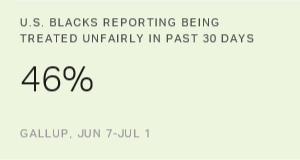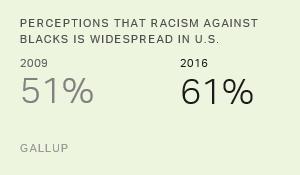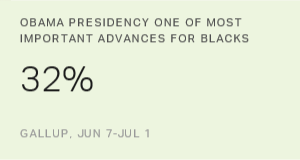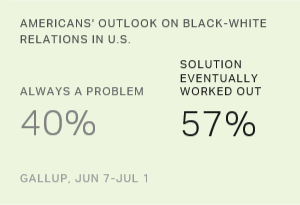Story Highlights
- Percentage treated unfairly similar to 2015, down from 2004
- Whites now more likely to think their community discriminates
- Blacks' views of discrimination in community mostly unchanged
WASHINGTON, D.C. -- Just before two fatal police shootings of black men in July sparked nationwide protests and an attack on police officers in Dallas, close to half (46%) of U.S. blacks reported being treated unfairly in at least one of five different situations within the past 30 days. These results, from a June Gallup poll, are similar to the 43% seen in 2013 and 2015. However, the figure is lower than the 59% recorded in 2004, the first time Gallup measured all five situations.
| 2004 | 2013 | 2015 | 2016 | ||||||||||||||||||||||||||||||||||||||||||||||||||||||||||||||||||||||||||||||||||||||||||||||||
|---|---|---|---|---|---|---|---|---|---|---|---|---|---|---|---|---|---|---|---|---|---|---|---|---|---|---|---|---|---|---|---|---|---|---|---|---|---|---|---|---|---|---|---|---|---|---|---|---|---|---|---|---|---|---|---|---|---|---|---|---|---|---|---|---|---|---|---|---|---|---|---|---|---|---|---|---|---|---|---|---|---|---|---|---|---|---|---|---|---|---|---|---|---|---|---|---|---|---|---|
| % | % | % | % | ||||||||||||||||||||||||||||||||||||||||||||||||||||||||||||||||||||||||||||||||||||||||||||||||
| In a store where you were shopping | 28 | 24 | 24 | 25 | |||||||||||||||||||||||||||||||||||||||||||||||||||||||||||||||||||||||||||||||||||||||||||||||
| In a restaurant, bar, theater or other entertainment place | 26 | 16 | 20 | 19 | |||||||||||||||||||||||||||||||||||||||||||||||||||||||||||||||||||||||||||||||||||||||||||||||
| At your place of work | 22 | 15 | 18 | 19 | |||||||||||||||||||||||||||||||||||||||||||||||||||||||||||||||||||||||||||||||||||||||||||||||
| In dealings with the police, such as traffic incidents | 25 | 17 | 18 | 16 | |||||||||||||||||||||||||||||||||||||||||||||||||||||||||||||||||||||||||||||||||||||||||||||||
| While getting healthcare for yourself or a family member | 20 | 9 | 12 | 12 | |||||||||||||||||||||||||||||||||||||||||||||||||||||||||||||||||||||||||||||||||||||||||||||||
| Treated unfairly in any of the five situations | 59 | 43 | 43 | 46 | |||||||||||||||||||||||||||||||||||||||||||||||||||||||||||||||||||||||||||||||||||||||||||||||
| Gallup | |||||||||||||||||||||||||||||||||||||||||||||||||||||||||||||||||||||||||||||||||||||||||||||||||||
Gallup has asked about unfairness in four of the five situations in 10 different years but included the question about healthcare only in 2004, 2013, 2015 and this year. In all 10 polls, blacks have been most likely to report unfair treatment while shopping. The first year Gallup asked these questions, 1997, was also the year that the highest percentage said they had been treated unfairly while shopping (30%).
Among the 46% of blacks who in 2016 reported receiving unfair treatment in at least one situation, slightly less than half (45%) listed only one of the situations. Twenty-five percent listed two, 20% listed three, 7% mentioned four, and 3% named all five.
Perceptions of Discrimination Growing Among Whites, Unchanged Among Blacks
In addition to asking U.S. blacks to report on their own treatment, Gallup has often asked Americans more broadly how they perceive blacks being treated in their community and in specific situations such as shopping and while at work. Combining the data from the 2004 and 2007 polls and the data from the 2015 and 2016 polls provides large enough samples to show changes over time. While blacks have become less likely to report being personally treated unfairly in recent years, their assessments of how blacks are treated in their community show little change from the 2004/2007 results to those from 2015/2016. Meanwhile, whites have become more likely in the past two years than previously to perceive that blacks are being treated less fairly than whites in their community.
| 2004/2007 | 2015/2016 | ||||||||||||||||||||||||||||||||||||||||||||||||||||||||||||||||||||||||||||||||||||||||||||||||||
|---|---|---|---|---|---|---|---|---|---|---|---|---|---|---|---|---|---|---|---|---|---|---|---|---|---|---|---|---|---|---|---|---|---|---|---|---|---|---|---|---|---|---|---|---|---|---|---|---|---|---|---|---|---|---|---|---|---|---|---|---|---|---|---|---|---|---|---|---|---|---|---|---|---|---|---|---|---|---|---|---|---|---|---|---|---|---|---|---|---|---|---|---|---|---|---|---|---|---|---|
| % | % | ||||||||||||||||||||||||||||||||||||||||||||||||||||||||||||||||||||||||||||||||||||||||||||||||||
| Blacks reporting being treated unfairly in past 30 days in any of the situations | 53 | 42 | |||||||||||||||||||||||||||||||||||||||||||||||||||||||||||||||||||||||||||||||||||||||||||||||||
| Blacks believing blacks in their community are treated less fairly in any of the situations | 84 | 83 | |||||||||||||||||||||||||||||||||||||||||||||||||||||||||||||||||||||||||||||||||||||||||||||||||
| Whites believing blacks in their community are treated less fairly in any of the situations | 37 | 46 | |||||||||||||||||||||||||||||||||||||||||||||||||||||||||||||||||||||||||||||||||||||||||||||||||
| Gallup polls in 2004, 2007, 2015 and 2016 | |||||||||||||||||||||||||||||||||||||||||||||||||||||||||||||||||||||||||||||||||||||||||||||||||||
In this year's poll, both blacks (67%) and whites (40%) are more likely to perceive that blacks are treated unfairly in "dealings with the police" than in any of the other four situations asked about. Among blacks, more than half also say blacks are treated less fairly "on the job or at work" and "in stores downtown or in the shopping mall." In every situation included in the poll, blacks are significantly more likely than whites to say that discrimination exists in their community.
- Fifty-two percent of blacks and 17% of whites say that blacks are treated less fairly on the job or at work.
- Fifty-two percent of blacks and 17% of whites perceive discrimination in stores downtown or in the shopping mall.
- Forty-one percent of blacks and 16% of whites think there is discrimination in neighborhood shops.
- Thirty-seven percent of blacks and 15% of whites think there is discrimination in restaurants, bars, theaters or other entertainment places.
Bottom Line
Blacks have been less likely to report unfair treatment in the past few years than they were in the 2004 and 2007 polls. Over the same period, the percentage of blacks saying their community discriminates against blacks has remained largely unchanged, while whites have become more likely to think blacks are treated less fairly.
With the widespread coverage of fatal police shootings of black men and subsequent protests across the nation in the past two years, it is not surprising that more whites have come to conclude that their community discriminates against blacks. Meanwhile, attitudes among blacks, who do not have to rely on news reports to become aware of such discrimination, have changed little.
That fewer blacks are saying they have experienced unfair treatment because of their race than were doing so several years ago is encouraging. Optimism about this trend, however, needs to be judged within the context that almost half of blacks in this year's poll reported at least one incident within a span of a month or less.
Survey Methods
Results for this Gallup poll are based on telephone interviews conducted June 7-July 1, 2016, with a sample of 3,270 adults, aged 18 and older, living in all 50 U.S. states and the District of Columbia, who had previously been interviewed in the Gallup Daily tracking poll and agreed to be re-interviewed for a later study. The sample is weighted to be representative of U.S. adults.
For results based on the total sample of national adults, the margin of sampling error is ±3 percentage points at the 95% confidence level. For results based on the sample of 1,320 non-Hispanic whites, the margin of sampling error is ±4 percentage points at the 95% confidence level. For results based on the sample of 912 non-Hispanic blacks, the margin of sampling error is ±5 percentage points at the 95% confidence level.
All reported margins of sampling error include computed design effects for weighting.
View complete question responses and trends.
Learn more about how the Gallup Poll Social Series works.




